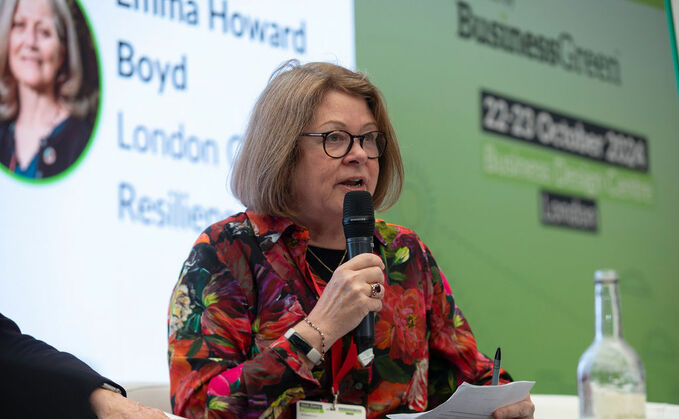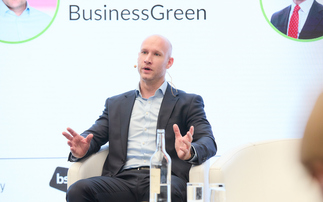
Julia King, Baroness Brown of Cambridge, chair of the Climate Change Committee's adaptation sub-committee - Credit: Naomi Gabrielle Photography
UK must get better at understanding the economic impacts of climate shocks and establish a clear, positive vision for climate adaptation, experts tell the Net Zero Festival 2024
The Labour party's missions for government are at risk of "locking in vulnerability" unless urgent steps are taken to enhance climate resilience, better understand the economic impacts of climate shocks, and establish a clear vision of a climate adapted UK, experts told BusinessGreen's Net Zero Festival 2024 today.
Discussing climate adaption strategies on the first day of the UK's leading green business event, Baroness Brown of Cambridge, who serves as chair of the Climate Change Committee's (CCC) adaptation sub-committee, stressed that the government urgently needed to present a clearer vision for what a well-adapted UK should look like.
"It needs to be a positive message and a vision that has really clear objectives and standard targets whereby you can measure progress," she told the audience.
A continued failure to set out that clear vision risks undermining the government's stated priorities - including its plans to ensure the UK's economic growth is at the highest sustained level in the G7 by the end of Labour's first term and its targets to make Britain a 'clean energy superpower' by 2030 - warned fellow panellist Emma Howard Boyd, chair of the London Climate Resilience Review.
"Adaptation is non-negotiable, it needs to be the bedrock of our transition investment strategies," said Howard Boyd. "If we're not making those investments ready for climate shocks, they can literally wash away. A strong message for government is that all of its missions, unless they are resilient to our changing climate, are at risk of being stranded."
Earlier this year, the CCC published an assessment of the government's Third National Adaptation Programme which warned the current plan falls far short of what is required to protect the UK economy from worsening climate impacts.
A High Court judge also ordered a Judicial Review of the UK's official plan for bolstering climate resilience earlier this year after campaigners alleged the most recent version of the National Adaptation Plan - which the government is required update every five years under the Climate Change Act - is not fit for purpose and must be enhanced.
King said damage and death caused by recent floods and hot summers had already issued a stern reminder of the importance of resilience measures, but that, sadly, it seemed some people and politicians needed to be "terrified" a bit more in order to act.
"The rate of change in the weather we've seen over the last 10 years is going to go on for the next 30 years at best," she explained. "We really do need to be getting to net zero, but in parallel we've got to be adapting as well, it's not an either or."
As such, Howard Boyd stressed that a key component of communicating the scale and urgency of the adaptation challenge is showing the lived experience of climate risks, which are often happening in quick succession.
"We have to tell it through the lens of 'this is happening now and this can be really serious'," she said. "But then we have to flip very quickly into solutions and the steps that we can take to get ready for climate risks. We don't have to look very far around the world to see how serious this is getting."
In terms of steps businesses can take, both King and Howard Boyd stressed that now is the time to create emergency climate plans that mirror those already place for IT system disruption, for example.
"I think it has to start with gaining a really good understanding of the risks your businesses could be exposed to," said King. "Do you understand the flood risk you could be exposed to? Do you understand the resilience of the critical services that you are dependent on?"
Howard Boyd added that physical risks and preparedness should be paid the same attention as emissions reduction in corporate reporting, while King added that presenting boards with climate scenarios and potential costs could stimulate action on adaptation if potential outgoings stretched into six figures.
"Most CFOs are already looking at probabilistic approaches to business returns," said King, who stressed that investing in the UK's energy security would have represented an "extraordinarily good investment" given the government has since paid tens of millions of pounds in subsidies amid soaring gas prices, as an example.
Estimates from the Environment Agency suggest overall government investment of around £1bn per year will be needed this decade to ensure the UK is adequately prepared for worsening flood hazards, while figures from the National Infrastructure Commission suggest £700m a year may be required to build resilience to increasingly frequent and intense droughts.
Ultimately, Howard Boyd said that adaptation costs needed to be seen not as "additional costs", but as money that will be saved over time as climate change worsens. "There's no doubt that we have to get better at understanding the economic impacts of climate shocks," she said.
BusinessGreen's Net Zero Festival returns tomorrow, Wednesday 23 October, at the Business Design Centre in Islington, London.









